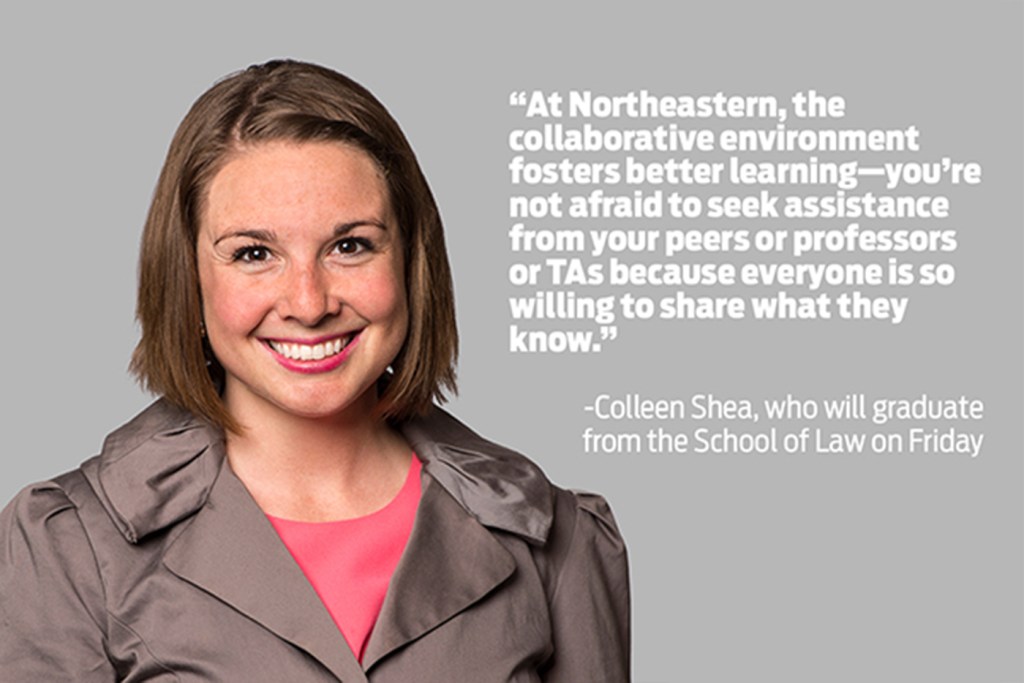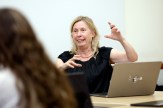Meet the graduates: Colleen Shea

Colleen Shea will graduate from the School of Law on Friday and then begin her new job as an attorney for the Disability Law Center in Boston, where she will work to represent low-income families in special education cases. Here, Shea, L’16, reflects on her past three years at Northeastern and looks ahead to her promising career in public interest law.
You earned your bachelor’s degree in integrated marketing communications and your master’s degree in special education. What compelled you to study law at Northeastern?
I chose Northeastern for a few reasons. Aside from receiving the Public Interest Law Scholarship, a full-tuition scholarship for academic excellence and public service, I really liked the co-op program. After receiving my master’s in 2012 and being out of school for two years, I was intimidated by the prospect of going back to school for another three, but co-op gave me the opportunity to work, which was by far my favorite part of the experience. With co-op, you can create your own destiny.
To support your forthcoming work with the Disability Law Center, you received the Skadden Fellowship, the most prestigious public interest fellowship in the country. Why have you chosen to pursue public interest law, and what will you focus on at the DLC?
Starting in August, I’ll be representing low-income families in special education cases, with a particular focus on students facing school discipline or being put in overly restrictive environments. “Warehousing” kids and removing them from the general population is a tool schools in low-income communities use to push those who might have behavioral issues into one room and effectively say “we’re not going to worry about you.” My job will be to work with students and families to help them navigate the school system and fine-tune tactics that will support their needs.
I enrolled at Northeastern with the intent of practicing public interest law. After working as a seventh-grade special education teacher for Teach for America following my undergraduate years and then serving as a corps member advisor for the program at a charter school in New York, it became pretty hard for me to do anything that didn’t support public interest education goals.
Your law school accomplishments run deep, from working as a teaching assistant in a torts class to completing four co-ops as a legal intern. What would you say is your biggest achievement at Northeastern?
I would say it was gaining experience through co-op. The most interesting co-op I did was working for Massachusetts Gov. Charlie Baker in the governor’s Office of the Legal Counsel. I got to see how government worked at the state level while attending meetings with him every week. And it was an incredible experience to see how government functions as well as the really complicated legal questions that came across our desk from all areas of the law.
The job was fast-paced, and I really elevated my research and writing and creative thinking skills as far as navigating problems that don’t have standard solutions—skills that will help me at the DLC. Education law often requires that kind of creativity.
Speaking of co-op, you worked at the Disability Law Center, where you developed legal claims and drafted hearing requests to be filed with the Bureau of Special Education Appeals; the aforementioned Massachusetts governor’s Office of Legal Counsel, where you drafted legal memoranda on topics such as whether ridesharing companies must comply with the Americans with Disabilities Act; and Kotin, Crabtree, and Strong, a general practice law firm where you worked on tort, Title IX, and special education cases. In what ways have these experiential learning opportunities prepared you for a career in public interest law?
All have taught me something different. At the DLC, my supervisor was a really great mentor who helped me improve my writing. At the Massachusetts Department of Elementary and Secondary Education, where I researched and wrote a policy memorandum addressing the feasibility of early exit criteria for English language learners with disabilities under Title IX, I got to see how statewide education policy is shaped. And at Kotin, Crabtree, and Strong, I learned that it is possible for a private firm to have a public-minded philosophy, to simultaneously make money from clients with means while giving back to those in need.
What advice do you have for incoming law students?
In the first year, it’s all a matter of figuring out what works for you and what helps you learn. Be open to failure and asking questions without fear. One of the biggest benefits I had going in is that I had gone into teaching with zero experience and had learned that you have to throw your shame out the window and be willing to ask for help. In law school, saying “I don’t know this, I don’t get it,” really helped me dive deeper into areas I needed to improve on as opposed to being too afraid to ask questions about things because I thought everyone else understood the material.
In the second and third years, it’s a matter of figuring out through trial and error what environment you want to work in and then making as many connections as possible in those areas to set yourself up for a job. Talk to other trainees that have been through it and get as much advice as possible to figure out what you’re best suited for.
Describe your fondest memory of the past three years at Northeastern.
In general, it was the camaraderie among my classmates. My peers were very willing to sit down and walk me through material, and that’s not something you often see at other law schools with competitive grading. At Northeastern, the collaborative environment fosters better learning—you’re not afraid to seek assistance from your peers or professors or TA’s because everyone is so willing to share what they know. On a more micro level, I felt very accomplished when I turned in my last final for a tough course on the federal court.





